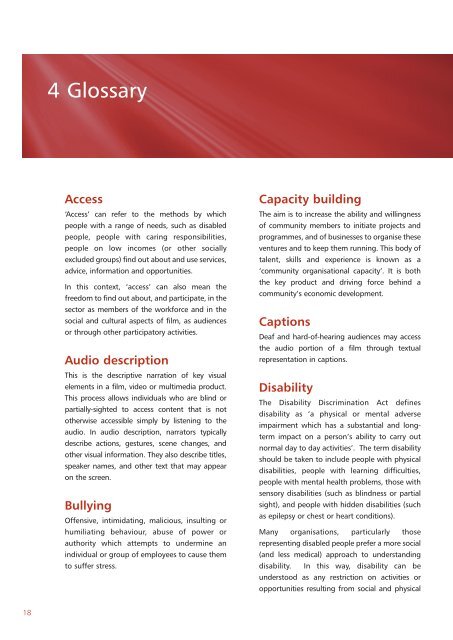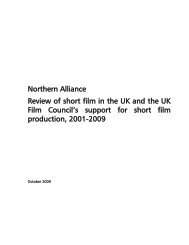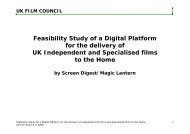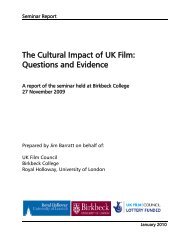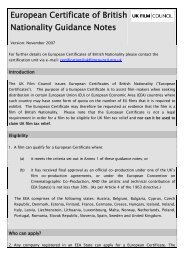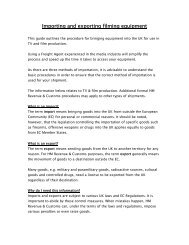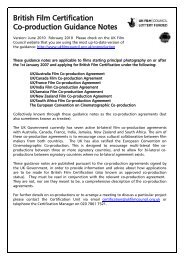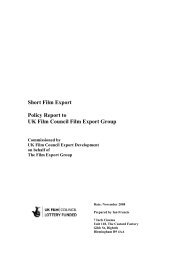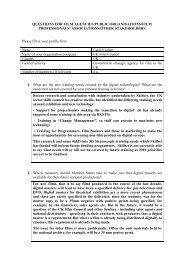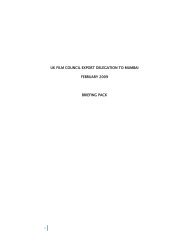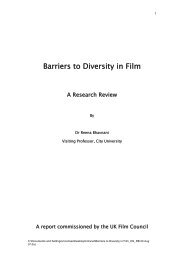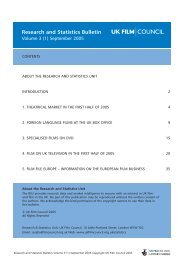Success through diversity and inclusion - BFI - British Film Institute
Success through diversity and inclusion - BFI - British Film Institute
Success through diversity and inclusion - BFI - British Film Institute
You also want an ePaper? Increase the reach of your titles
YUMPU automatically turns print PDFs into web optimized ePapers that Google loves.
18<br />
4 Glossary<br />
Access<br />
‘Access’ can refer to the methods by which<br />
people with a range of needs, such as disabled<br />
people, people with caring responsibilities,<br />
people on low incomes (or other socially<br />
excluded groups) find out about <strong>and</strong> use services,<br />
advice, information <strong>and</strong> opportunities.<br />
In this context, ‘access’ can also mean the<br />
freedom to find out about, <strong>and</strong> participate, in the<br />
sector as members of the workforce <strong>and</strong> in the<br />
social <strong>and</strong> cultural aspects of film, as audiences<br />
or <strong>through</strong> other participatory activities.<br />
Audio description<br />
This is the descriptive narration of key visual<br />
elements in a film, video or multimedia product.<br />
This process allows individuals who are blind or<br />
partially-sighted to access content that is not<br />
otherwise accessible simply by listening to the<br />
audio. In audio description, narrators typically<br />
describe actions, gestures, scene changes, <strong>and</strong><br />
other visual information. They also describe titles,<br />
speaker names, <strong>and</strong> other text that may appear<br />
on the screen.<br />
Bullying<br />
Offensive, intimidating, malicious, insulting or<br />
humiliating behaviour, abuse of power or<br />
authority which attempts to undermine an<br />
individual or group of employees to cause them<br />
to suffer stress.<br />
Capacity building<br />
The aim is to increase the ability <strong>and</strong> willingness<br />
of community members to initiate projects <strong>and</strong><br />
programmes, <strong>and</strong> of businesses to organise these<br />
ventures <strong>and</strong> to keep them running. This body of<br />
talent, skills <strong>and</strong> experience is known as a<br />
‘community organisational capacity’. It is both<br />
the key product <strong>and</strong> driving force behind a<br />
community’s economic development.<br />
Captions<br />
Deaf <strong>and</strong> hard-of-hearing audiences may access<br />
the audio portion of a film <strong>through</strong> textual<br />
representation in captions.<br />
Disability<br />
The Disability Discrimination Act defines<br />
disability as ‘a physical or mental adverse<br />
impairment which has a substantial <strong>and</strong> longterm<br />
impact on a person’s ability to carry out<br />
normal day to day activities’. The term disability<br />
should be taken to include people with physical<br />
disabilities, people with learning difficulties,<br />
people with mental health problems, those with<br />
sensory disabilities (such as blindness or partial<br />
sight), <strong>and</strong> people with hidden disabilities (such<br />
as epilepsy or chest or heart conditions).<br />
Many organisations, particularly those<br />
representing disabled people prefer a more social<br />
(<strong>and</strong> less medical) approach to underst<strong>and</strong>ing<br />
disability. In this way, disability can be<br />
understood as any restriction on activities or<br />
opportunities resulting from social <strong>and</strong> physical


